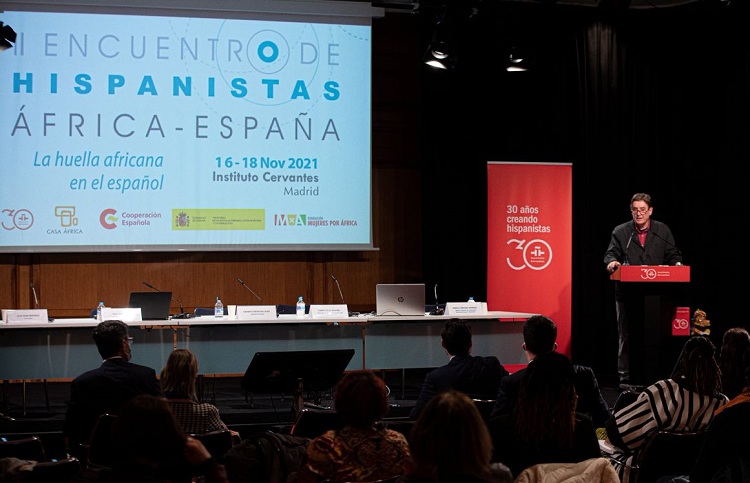Eduardo González
The Instituto Cervantes concluded yesterday at its headquarters in Madrid the second Meeting of Hispanists Africa-Spain, in which some thirty Hispanists reflected on the influence of Spanish and African languages in both directions.
“Our language and our culture interest Africans and this interest must be one of the pillars of the new partnership with Africa, which we aspire to build with the third Africa Plan and the Africa 2023 Focus,” said the Minister of Foreign Affairs, José Manuel Albares, through a video message to close the event, organized by the Instituto Cervantes, Casa África, the Spanish International Agency for International Development Cooperation (AECID) and the Ministry of Foreign Affairs, with the collaboration of the Women for Africa Foundation.
“The situation of the Spanish language on the African continent could not be more promising,” Albares continued. “Of the fifteen countries with the most students of Spanish as a foreign language in the world, five are African: Ivory Coast, Benin, Senegal, Cameroon and Gabon,” she added. “Moreover, Spanish has become an official working language in the African Union in 2020, at the request of Equatorial Guinea”, he added.
The conference was inaugurated last Tuesday by the State Secretary for Foreign and Global Affairs, Ángeles Moreno Bau, who recalled that seven percent of the total number of Spanish students in the world come from the African continent and announced that the possibility is being contemplated that the future third Meeting be held in an African country as a “sign of encounter and concord”.
During the opening of yesterday’s event, the State Secretary for Ibero-America and the Caribbean and Spanish in the World, Juan Fernández Trigo, stated that “one of the structural elements of our position in the world is, without a doubt, the strength of our common language” and, therefore, the upcoming inauguration of the Instituto Cervantes center in Dakar, which will take place on December 13 and will be presided over by the Queen, “is a good example of this renewed vocation of our action in Africa”.
Possible Language Observatory
In his closing speech, the director of the Instituto Cervantes, Luis García Montero, recalled that Africa is currently “the most complex linguistic area in the world”, with between 1,000 and 3,000 indigenous languages, and that “over the course of the 21st century, the African population will double, to over 4 billion inhabitants, that is, 40% of the world’s population”. In this context, the French, British and Portuguese governments have shown a great interest in promoting their languages on the continent because “they are estimating that in the next few years the number of English and French speakers in Africa could increase to one billion, and the number of Portuguese speakers to 250 million”. “We are in other conditions because the presence of the Spanish in the African colonialism was much smaller; what interests us is to promote a bilingualism that serves culturally to overcome prejudices”, he admitted.
In this sense, he said, “for us it is very important the implementation of the Instituto Cervantes in Dakar and the Cervantes Classroom in Abidjan and the commitment to find a budget so that in 2023, at the latest, the Observatory of Spanish in Africa can finally be put into operation, which we consider, although studies are still on the table, that it should be located in Equatorial Guinea as an African country where Spanish is spoken”. The Observatory, which when it starts up will be the second Cervantes Observatory in the world (there is only one, at Harvard University in the United States), will bring together researchers and Hispanists to study the present and future of Spanish on the continent.
According to data released by Cervantes during the conference, Spanish is studied in 32 countries on the African continent, with a total of 2,024,164 students of Spanish as a foreign language. Of these, 1,847,870 are in Sub-Saharan African countries, in a total of 26 countries in the region. The countries with the largest number of students are Ivory Coast, with 566,178 students, Benin, with 412,515 students, and Senegal with 356,000. Separately, in Equatorial Guinea, there are 906,779 people with native proficiency in Spanish, 318,598 people with limited proficiency in the language and 128,895 students of Spanish.
In the African university environment, Spanish is present in 68 Spanish departments in 33 African countries. The Instituto Cervantes is also present in 21 cities on the African continent, in six countries: Algeria (three cities), Egypt (two cities), Morocco (thirteen cities), Tunisia (one city), Senegal (one city) and Ivory Coast (one city).






